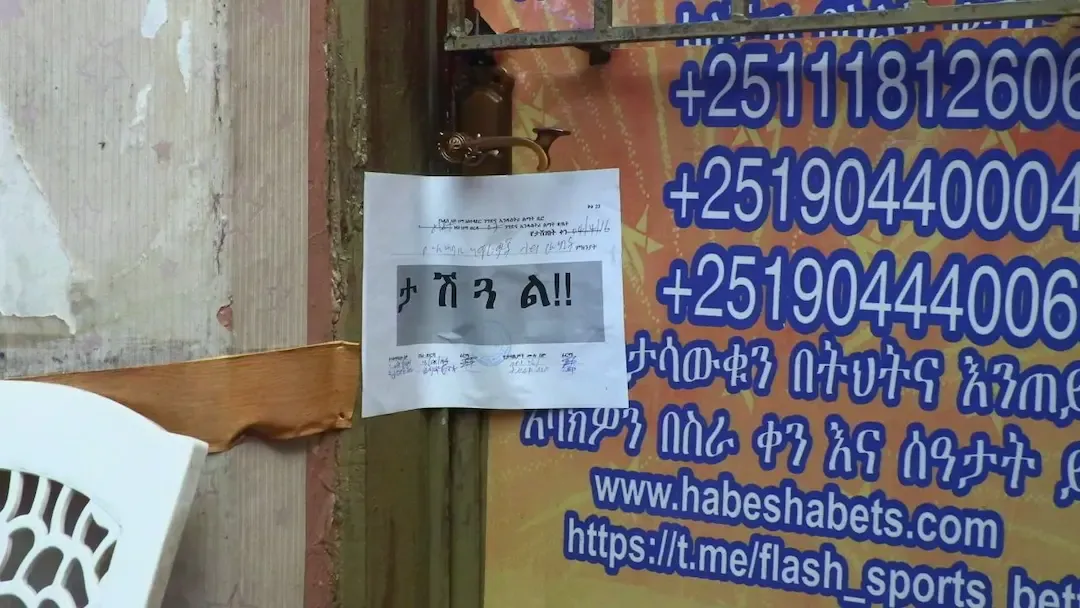Progress for 0 ad
Progress for 1 ad
Progress for 2 ad
Progress for 3 ad


Daniel Metaferiya
Addis Ababa, Ethiopia

On a sunny Saturday in October, Leul Girmay, 27, a ride-hailing driver, sat on the street outside a building in Addis Ababa where he often parked his Toyota Yaris. The midday sun glinted off his phone as he scrolled through it, tears forming at the corners of his eyes. Earlier that morning, he had wagered his fuel money on one of Ethiopia’s numerous digital betting platforms, hoping to double it. By the time he put his phone down, he had lost two thousand Birr.
Leul’s game of choice is Keno, a game of pure chance in which players select numbers in the hope of matching those drawn at random. On most afternoons, Leul and his close friends gather around their phones for hours, calling out numbers to one another and anxiously tracking the results on their screens. By sharing their choices, they hope to increase their odds of winning, and when someone hits a number, that person may cover a friend who is on a losing streak.
“It has been a while since I won,” Leul said, his voice low and regretful.
That regret echoes across Ethiopia, where online betting has exploded in the last two years, not just in scale, but in seductive variety. By 2024, the Ethiopian Lottery Service, formerly known as the National Lottery Administration, had licensed nearly eighty enterprises to operate. Just two years prior, a nationwide crackdown shuttered thousands of physical shops, a bid to rein in the frenzy. But the houses didn't fold; they pivoted, slipping seamlessly into apps and websites.
“No more dragging papers,” Leul said, a faint smile betraying his acceptance of the new reality. He has adapted to the digital shift just as the companies themselves have.
A federal audit of the Lottery Service, a lucrative asset of Ethiopian Investment Holdings' portfolio, paints a stark picture of unchecked growth. Back in 2020, it raked in 160 million Birr from permits, fees, and cuts, tripling its 55 million-Birr target. Fast-forward to 2024: In a mere six months, collections hit 410 million Birr, blowing past the full-year goal by 4 million. Experts pin the surge on fresh game formats and the lightning-fast rollout of digital payments, tools that make every bet as easy as a swipe.
It wasn't always this virtual. A decade ago, Addis Ababa's first betting dens popped up like weeds, buzzing with wagers on soccer showdowns. They spread fast through the capital and a handful of other cities, neon signs drawing crowds. But the glow faded under public fury, amplified by the Ministry of Women and Social Affairs' push to slam them shut.
With no outright ban on gambling, the industry didn't blink. It went digital, blooming in the post-COVID void. Offerings ballooned beyond sports: lotteries of skill and chance, all at players' fingertips. Across Africa, this shift has supercharged the sector, with valuations climbing 6.7% yearly toward a projected $12 billion in the coming years, according to Astute Analytics. Ethiopia, it seems, is along for the ride, driven by digitization, commercialization, and smartphone penetration. Some are paying dearly.

Abenet Sisay (a pseudonym), a 28-year-old waiter at one of Addis's glitzy five-star hotels, knows the pull all too well. During lulls in his shift, he fishes out his phone for Aviator: a hypnotic "crash" game where players stake cash on a pixelated plane's flight path before it nosedives. Months back, payday's promise turned to ash. Flush with 20,000 Birr in wages, he dove in for "just a few rounds." Hours later, his account read zero.
“Some energy keeps pulling me to check on that plane,” Abenet said, shaking his head.
Despite borrowing from family and friends to cover his living expenses, he continues to place small bets every day, wagering on the red plane. Abenet says that most of his friends and colleagues are also playing similar games, hoping to increase their income. “There are triggers everywhere,” he admitted. “Nearly everyone I know is playing one of these games.”
Aviator is a standout in the crash-game craze, but it's got fierce rivals vying for eyeballs and attention: bets on whether a cartoon chicken darts across a road, or spins on faux slot reels that chime like Vegas. These games have become viral sensations in several countries. Spribe, the Georgia-based developer behind Aviator, provides games to over 4,500 online platforms in more than 100 countries and reportedly attracts close to 40 million unique monthly players. In many markets, a handful of companies develop software kits used by most betting operators.
In Ethiopia, several dozen platforms rely on tailored versions of betting software solutions developed by Convex Technology, based out of the United Arab Emirates. The company has clients in more than 10 African countries. Tabor Shiferaw, Convex’s CTO, says several features that can curb addictive behavior are available in their offerings, like limits on deposits, losses, or time-based controls that automatically log users out after prolonged play.
“But the betting companies don’t want any of these features, “ the CTO told Shega
When a new online betting company launches, it usually chooses from a selection of preloaded games offered by one of these providers.
Despite their superficial differences, many of these virtual games share similar mobile-first design and marketing strategies intended to foster habit-forming behavior. Their constant availability, unpredictable rewards, and rapid gameplay can stimulate impulsive betting and deep immersion. Immersive visuals, illusions of control, and personalized bonuses reinforce engagement, while social normalization, particularly among the young and the practice of chasing losses, deepen addiction and financial risk. Many of the virtual games available in Ethiopia allow players to wager as little as two Birr, lowering the barrier to entry.
“Betting platforms tap into deep human behavioral tendencies,” said Bereket Tsegaye, a psychiatrist at Alert and St. Paul’s Hospital. He has observed that virtual betting games have evolved into a serious social problem.
“We are treating patients who have sold their cars and houses,” Bereket told Shega. He added that many young people do not have sufficient money for gambling and often resort to other means of obtaining it. “They steal from their parents, friends, or even strangers,” he said.
In one incident two years ago, a system glitch allowed customers of the state-owned Commercial Bank of Ethiopia to withdraw money from their accounts that was not theirs. Many of the perpetrators in the overnight fiasco were college students who withdrew the money and deposited it at betting platforms. CBE was forced to prepare a particular form for those who funneled the money to betting companies in its attempt to redeem the funds.
Across social media, reports of self-harm prompted by digital gambling addiction have also significantly increased in recent years. According to the World Health Organization, online gambling fuels behavioral addiction, affecting 1.2% of adults globally, with 24/7 access amplifying risks in low-income nations like Ethiopia, where it spikes suicide odds 15-fold, erodes savings, and unravels families amid unchecked digital proliferation
Many young users fall into addiction after being introduced to games through a friend’s suggestion, a one-time win, or misleading promotions on social media. A betting company ad is almost an inevitability in live broadcasts of most sporting events. For a while, Ethiopia’s elite soccer league was even called Betking Ethiopian Premier League for sponsorship reasons. Some platforms invest heavily in social media, while a few like Birrbet rely on mass SMS messages offering bonuses as high as 10 times initial deposits
Age verification is minimal. Ticking a box confirming a user is 21 years old is often the only requirement to start playing.
A major shareholder in a popular betting company, speaking on condition of anonymity, said several developments across different sectors have accelerated the rise of online betting. He pointed to the spread of mobile internet access, the convenience of instant payments, and regulatory relaxations as the main drivers.
A crackdown on betting companies without tackling the rise of drug use like khat or liquor, amongst the youth, appeared paradoxical to the businessman.
“With proper guardrails, the platforms could generate significant economic gains without harming social fabrics,” he said.
Revenue generated by betting platforms is indeed driving gains across multiple sectors. A lion’s share of the revenue generated by payment operators is tied to betting platforms. The Ethiopian Lottery Service collects hundreds of millions of birr in annual revenue from licensing fees and commissions. Advertising revenue and schemes claiming to exploit algorithms also generate income for a few unscrupulous individuals on social media.
However, the flourishing of virtual betting games is largely tied to a regulatory grey zone, much like the rest of Africa. Research on gambling legislation across 41 African countries found that virtual games were explicitly addressed by the law in 15 countries (36.6 percent), while advertising them was explicitly addressed in 18 countries (43.9 percent).
In Ethiopia, a 2021 proclamation designated the Ministry of Revenues as responsible for permitting lottery operators. However, failure to enact further regulations has allowed the Ethiopian Lottery Service to remain the main overseer. The Service collects fees from operators while also offering its own virtual games. These games are often similar to private offerings, featuring a flying flamingo or a chicken crossing a road, presented in Amharic. The ELS has made clear its intention to expand technology-enabled chance-based games and increase revenue, a goal it plans to achieve by 2022 E.C.
A federal audit of the ELS two years ago identified serious gaps in public communication regarding the societal harms of lottery games. The 2021 internal report noted negative social consequences, but the audit found the agency had failed to effectively warn the public. In response, the Service has increased licensing fees from 400 Birr to 500,000 Birr, raised renewal fees to 100,000 Birr, and introduced a 1.5 million Birr bank guarantee requirement.
“The inability of the Service to put in place measures that minimize harm to the public is causing psychological, social, and economic issues,” the audit reads. The Ethiopian Lottery Service did not respond to requests for comment.
Abdulatif Mohammed, head of the Youth Behavioral Development Desk at the Ministry of Women and Social Affairs, said the rise of betting games is tied to regulatory gaps. He praised the closure of physical betting shops but noted that tensions with the Lottery Service persist. “They focused on physical shops, but the powers and duties they hold are incompatible with the current landscape,” he said.
Digital betting in Ethiopia continues to expand, fueled by technology, regulatory gaps, and sophisticated marketing. Yet behind the growth are visible human costs. Screens that promise windfall too often deliver losses. Savings evaporate, relationships strain, and the social fabric frays, all while regulatory authorities and operators continue to navigate an uncertain landscape.
The shift from physical shops to digital platforms has transformed the betting landscape. The games are no longer just numbers on paper; they are immersive, fast-paced, and relentless in their appeal. The Ethiopian public is embracing these platforms with astonishing speed, even as concerns over social and economic harm mount. For many, digital betting has become a daily ritual, a source of hope, and a source of despair.
👏
😂
❤️
😲
😠

Daniel Metaferiya
Daniel Metaferiya is a writer, journalist and radio host, with a keen interest in technology. He follows developments in Ethiopia's startup ecosystem closely and is passionate about profiling unique MSMEs.
Your Email Address Will Not Be Published. Required Fields Are Marked *